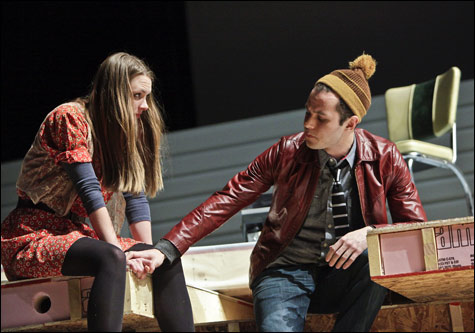Clifford Odets's 1935 Paradise Lost, which is getting a rare revival from the American Repertory Theater (at the Loeb Drama Center through March 20), also treats issues of class — though at more of a poetic roil than a cheeky simmer. And in the wake of the all-new Diane-Paulus-helmed ART's recent Shakespearean sorties to Studio 54 (The Donkey Show) and Manderley (Sleep No More), Daniel Fish's period-hopping, video-augmented approach to the Depression-era drama, stretched across the wide Loeb stage, is a little like a resurgence of the Taliban after "Mission Accomplished" on the aircraft carrier — a return to the old ART, except that the previous regime would never have laid its auteurist hand on anything as homegrown and eloquently propagandistic as Odets. That said, Fish's visually enhanced production — its huge screen both dwarfing the performers and offering their travails in close-up — ameliorates without upstaging Odets's somewhat speechifying, quaintly slang-ridden vision of a humbling yet humanizing revolution in which a once-prosperous middle-class family, the shards of its dismantled (or perhaps never mantled) life thrust out on the street, lose everything except the possible dawning of a new day when "no man fights alone."
Of course, it doesn't take genius (or the AIG T-shirt that appears in the third act) to see the keen contemporary relevance of Odets's 75-year-old portrait of mid-level haves brought low by massive unemployment, an imploding economy, and what original Paradise Lost director Harold Clurman dubs in his introduction to the printed script the "general fraud" perpetrated by the upper classes. Here, idealistic handbag manufacturer Leo Gordon is brought to ruin (and hope) by the conjoined machinations of the Depression, his own honest dealings, and ambush by an unhappy, unscrupulous business partner. Going down with Leo is a large cast of characters representative of a decaying, deluded middle class; they include his immediate family (their dreams of opportunity and accomplishment dashed), various hangers-on who as much as live with the Gordons, and one socialist-manifesto-spewing furnace stoker. Only the hustling, criminal character of Kewpie (originally played by Elia Kazan) thrives — rich but empty.

PARADISE LOST: It doesn’t take genius to see the contemporary relevance of Clifford Odets’s 75-year-old portrait of mid-level haves brought low by massive unemployment and an imploding economy. |
With its eerie amplification, its spillover onto looming video, and a setting more warehouse than our house, Fish's production is both striking and distancing. The acting, however, is by and large urgent and natural, with David Chandler a sincere but far from spineless Leo, Michael Rudko exuding fiery agitation as the furnace man, T. Ryder Smith effective as both a dying son and a ghoulish arsonist, and Sally Wingert earthiness itself as the mom who thinks repeated offers of "a piece of fruit" will hie us all back to Eden.